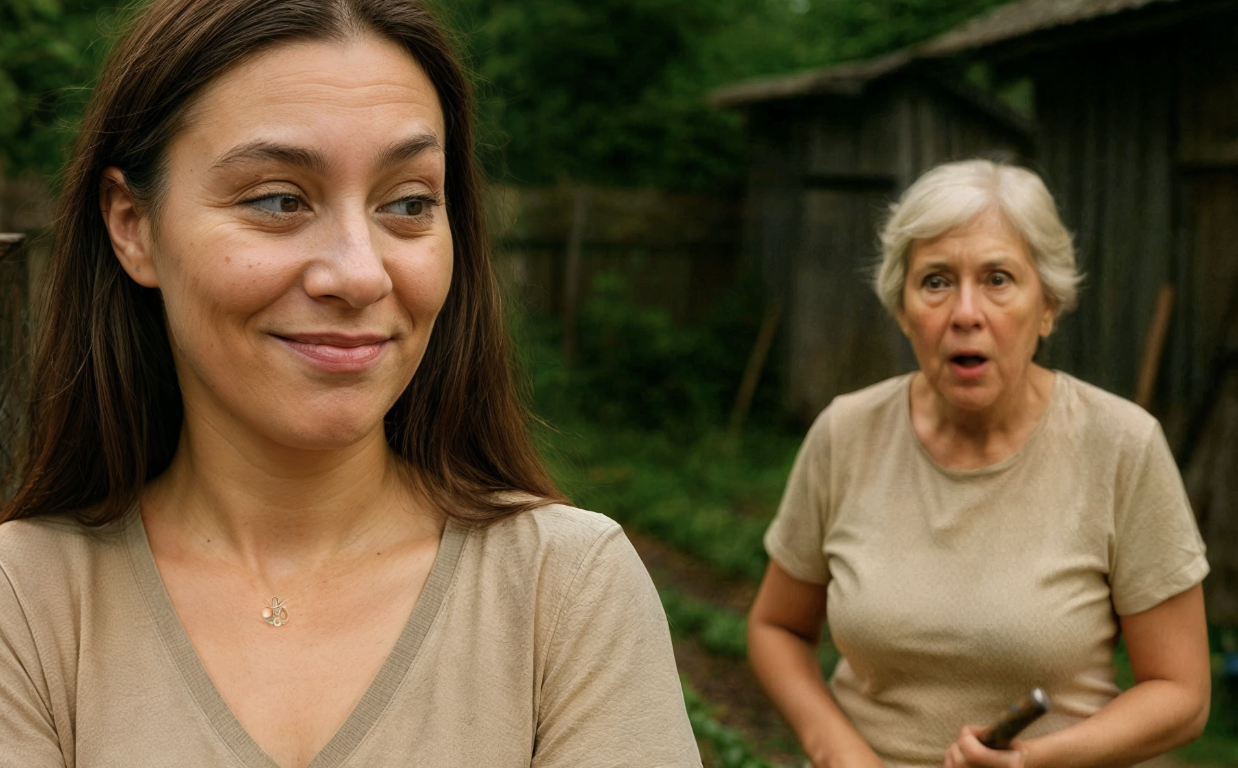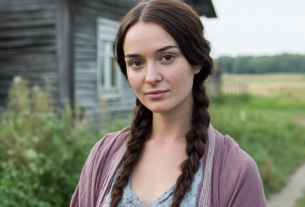Valya closed her laptop and stretched in her chair. The workday in online sales had gone well—several large orders had brought in a nice profit. Sixty-two thousand a month allowed her to feel confident, especially together with Pavel’s salary. Her husband worked as a driver, earned about fifty-five thousand, and together they had no problem paying the mortgage on their two-room apartment.
Pavel came home around seven, tired after a long trip. They had dinner and discussed their plans for the weekend. Then the phone rang—it was her mother-in-law.
“Hi,” Valya answered, seeing Lidiya Petrovna on the screen.
“Valechka, I have a suggestion. Let’s all go together to my sister’s dacha, there’s a lot of work there right now. It’s summer, the busiest time.”
Valya glanced at her husband, who raised his eyebrows with a tired expression.
“And what needs to be done there?”
“Oh, just the usual country chores. Weeding the beds, earthing up the potatoes, hauling water for watering. My sister, you know, rarely gets out there—work, city errands. And the plot is big, she can’t manage without help.”
“And when are you planning to go?”
“For the weekend. Saturday morning, nice and early. I thought you and Pavel are young and energetic—you’ll handle the heavy work just fine. And my sister and I will find something lighter to do.”
Pavel took the phone from his wife.
“Mom, and who’s paying for the trip? Gas, food?”
“Oh, Pavlik, come on. You didn’t buy the car for me. And as for food—everything there is homegrown.”
Valya took the phone back.
“Lidiya Petrovna, whose plot is it? And who gets the harvest?”
“The plot is my sister’s, of course. And the harvest… Well, everything is shared. We’re family.”
After the call, Valya sat down next to her husband on the couch.
“Pavel, do you understand what this is about? Your aunt has a dacha, she doesn’t go there herself, but she takes the harvest. We’re being invited to work there for free, and on top of that, pay our own way to get there.”
“Well, going a couple of times is no big deal. Mom needs help.”
“Mom? Pavel, your aunt is not my family. I’ve never even seen her in my life. And your mom talks about a shared harvest, but I strongly doubt we’ll even see a bunch of dill out of it.”
“Valya, don’t exaggerate. We’ll get something too.”
“It matters to me. I only have two days off a week. I don’t want to spend them working in someone else’s garden.”
Pavel shrugged and turned on the TV. The conversation ended there, but Valya could see that her husband hadn’t understood her position.
The next day, Lidiya Petrovna called again.
“Valya, I’ve been thinking. On Saturday we’ll leave early in the morning, around six. So we can get more done before the heat.”
“I’m not going,” Valya said.
“What do you mean, you’re not going? And why not?”
“Because I have my own plans for the weekend.”
“Oh, listen to yourself! Women used to be different. They wouldn’t sit around discussing things, they’d just go and help. Without asking who or why.”
“In the past, women did a lot of things under pressure. But times have changed.”
“And this is how they raise you nowadays. Brought a wife into the family, and what’s the use of her?”
Lidiya Petrovna hung up. Valya sat there with the phone in her hand, feeling a mix of irritation and hurt.
In the evening Pavel came home from work and went straight to his wife.
“Mom called. She said you spoke to her rudely.”
“Not rudely, just honestly.”
“Valya, they’re close relatives. We’ll go once, what’s the big deal?”
“Pavel, explain this to me. The dacha belongs to your aunt. Your aunt also takes the harvest. For what reason am I supposed to work there?”
“Well, at least because Mom is asking.”
“Your aunt is not my family. I don’t know her, I’ve never seen her. And if your mom wants to help her—she can go herself.”
“Mom has a hard time. She’s not that young anymore.”
“And it’s easy for me? I have a full workweek like everyone else. Weekends are the only time I have for myself.”
“But you work from home, you’re not sitting in an office.”
Valya felt everything inside her tense up. That old tune again about how working from home isn’t real work.
“Pavel, I earn more than you. And I work no less than eight hours a day. The fact that I do it at home doesn’t mean I’m resting.”
“Still, it’s not the same strain as physical labor.”
“And how would you know? Have you ever sat at a computer for ten hours straight?”
The conversation hit a dead end again. Pavel went to take a shower, and Valya stayed in the kitchen, thinking it over.
The next day at work, Valya told her colleague Natasha about the family conflict.
“Listen, maybe you really should go? Just once, for the sake of peace in the family.”
“Natasha, you don’t get it. If I go once, they’ll drag me out there every weekend until autumn. And then they’ll make me help dig up the potatoes.”
“Well, not every single weekend.”
“Every weekend. I know this tactic. First they ask as a favor, and then it turns into an obligation.”
On Thursday, Lidiya Petrovna called Pavel at work.
“Pavlik, I’ve been thinking. Maybe you should go by yourself? And we’ll leave Valya at home, since she’s so set in her ways.”
“Mom, don’t talk about Valya like that.”
“How else should I talk? She clearly said she won’t break her back over someone else’s cucumbers. That’s what wives are like these days.”
“Mom, Valya works a lot. She gets tired.”
“Everyone works and gets tired. But before, wives supported their husbands instead of resisting family duties.”
Pavel came home upset.
“Mom is really hurt. She says you offended her.”
“How? By refusing to work for free?”
“By refusing to help the family.”
“Pavel, what family is this, exactly? When was the last time you saw your aunt?”
Pavel thought for a moment.
“At our wedding. Three years ago.”
“Exactly. In three years she hasn’t called once, hasn’t asked how we’re doing. And now she suddenly needs help—and we’re family again.”
“But Mom is asking.”
“Mom is asking on her behalf. Not for herself, but for her sister. What do we have to do with it?”
“Well, I don’t know. Maybe it really does look messy.”
On Friday evening Pavel packed a bag.
“I’ll go by myself. I don’t want to upset Mom.”
“Okay. Go.”
“You don’t mind?”
“Mind what? You’re an adult, you decide how to spend your weekend.”
“And what will you do?”
“Work. I have an important project, the deadline is Monday.”
Pavel kissed his wife and left. Valya stayed home and felt relieved. She hadn’t had to persuade anyone or ruin her weekend.
On Saturday morning Pavel left with his mother for his aunt’s dacha. Valya got to work—she needed to prepare a presentation for a big client. She sat at the computer until lunch, then made herself something light to eat and kept working.
Around four her husband called.
“Hey. How’s it going?”
“Good. I’m working. And you?”
“Tired. We’ve been weeding beds since morning, then earthing up potatoes. Hauled water for watering—the well is far away, it’s hard.”
“And what did your aunt and your mom do?”
“Sat in the shade and talked about the neighbors. They say they’re too old for hard work.”
“I see. Did they at least feed you?”
“They did. Boiled potatoes and cucumbers. Mom said that’s what a dacha treat is.”
“Luxurious.”
“Valya, maybe you could come tomorrow after all? There’s still a lot to do, and it’s hard for me alone.”
“Pavel, I’ve already explained. It’s not my dacha.”
“But we’re family…”
“What family? Your aunt didn’t even say hello to me when you tried to hand her the phone.”
“She’s shy.”
“Or she just doesn’t consider me a person. Which seems more likely.”
The conversation ended on a dry note. Valya went back to work, but her mood was spoiled.
On Sunday morning, Lidiya Petrovna called again.
“Valya, did you change your mind? It’s hard for Pavlik alone, and there’s still a full day of work.”
“I didn’t change my mind.”
“Why are you so stubborn? They really need help.”
“Lidiya Petrovna, your sister needs help. That has nothing to do with me.”
“How does it not? You’re my son’s wife.”
“And what does that mean?”
“That you should support the family.”
“I do. I support Pavel, I support you. But I’m not obliged to support strangers.”
“Strangers? How dare you!”
“Your sister is a stranger to me, Lidiya Petrovna. We don’t know each other, we’ve never talked. Why on earth should I work for her?”
“Because that’s what normal wives do.”
“Normal wives do a lot of things. But working on other people’s dachas isn’t part of the job description.”
Lidiya Petrovna hung up again. Valya understood that the conflict was only heating up.
Pavel came back on Sunday evening, dirty and exhausted.
“So, did you get a lot done?”
“A lot. We weeded the whole plot, earthed up the potatoes, watered all the beds. Tomorrow Aunt Nina will come to pick the first harvest.”
“Tomorrow? And when did you all pick it?”
“We didn’t. Mom said that’s not our business.”
Valya looked at her husband closely.
“So you worked there for two days, and the harvest will go to your aunt?”
“Well, yeah. It’s her dacha.”
“Pavel, do you realize you were used?”
“What do you mean, used?”
“It’s very simple. You were free labor for two days. They didn’t even feed you properly.”
“Come on, it’s not like that. We’re family.”
“What family? Did your aunt even say thank you?”
Pavel thought.
“She didn’t. But she was probably shy.”
“Or she just takes it for granted.”
The next day at work, Lidiya Petrovna was telling her colleagues what an ungrateful daughter-in-law she had.
“Can you imagine, I asked her to help my sister, and she refused. Says she won’t break her back for someone else’s cucumbers.”
“Is your sister ill or something?” one coworker asked.
“No, she’s fine. She just doesn’t have time for the dacha.”
“And who gets the harvest?”
“My sister, of course. It’s her plot.”
“Well then maybe she should work it herself? Or hire someone.”
Lidiya Petrovna pursed her lips. This turn in the conversation did not suit her at all.
At home, Valya received a message from an unknown number.
“This is Nina, Lidiya’s sister. I wanted to thank your husband for his help. He really helped us out.”
Valya replied politely.
“I’ll tell him. Pavel is always ready to help.”
“And why didn’t you come? Lidiya said she invited you.”
“I was busy with work.”
“I see. And next weekend, will you be able to come? There’s still a lot to do.”
Valya stared at the message. So this had only been the beginning.
In the evening her husband came home tired but content.
“Did Aunt Nina text you?”
“She did. She thanked you for your help. And immediately invited us for next weekend.”
“Well, you see, they liked how we work.”
“How you work. I wasn’t there.”
“Valya, maybe you could go at least once? Just to keep up appearances, so we don’t spoil relations.”
“Pavel, explain one more time—who exactly am I supposed to keep up relations with? A woman I saw once at our wedding?”
“Well, with the family.”
“I get just as tired at work as you do. Spending my rare weekends knee-deep in dirt is not my idea of a good time.”
Pavel shrugged and went to have dinner. The conversation, as usual, led nowhere.
The next weekend Pavel went to the dacha again. Valya stayed home and decided not to waste her time. She’d long wanted to try a side hustle on marketplaces—selling goods online. She registered on a platform, studied the popular categories, and contacted suppliers.
Over the weekend she managed to post her first listings and receive several orders. The work turned out to be interesting—it required attention to detail, but it paid well.
Pavel came back Sunday evening, as usual dirty and tired.
“How’s it going? Get a lot done?”
“We stripped all the raspberries, the currants too. Weed the beds with onions. Aunt Nina is coming tomorrow for the berries.”
“Again tomorrow? And did they give you anything?”
“They did. A jar of last year’s jam.”
Valya nodded and kept working at the computer.
“And what did you do?” her husband asked.
“Started a side business. I’m selling goods online.”
“Why? Don’t we have enough money?”
“We do. But it’s better to spend the weekend usefully than sit around doing nothing.”
In a month the side job was bringing in a stable income. Valya had built relationships with suppliers, studied demand, and optimized her processes. By July she’d managed to earn an extra twenty thousand rubles.
Pavel kept going to the dacha every weekend. He came back exhausted, sometimes brought vegetables or berries. But they disappeared almost immediately—his mother took them for herself, her sister, and the neighbors. Their own family got scraps.
In early August Pavel came back from the dacha with a big crate of tomatoes and cucumbers.
“Look how much I brought! Aunt Nina said this is for Mom.”
Valya glanced at the crate and smirked.
“For Mom? So tomorrow all this is going to Lidiya Petrovna?”
“Well yeah. But she’ll leave us something.”
“A couple of cucumbers from a crate you picked yourself. Generous.”
“Valya, don’t be sarcastic. We’re family.”
“What family? They’re using you as free labor, and you’re grateful.”
Pavel set the crate on the floor and went to shower. He didn’t want to talk.
The next day, Lidiya Petrovna picked up the crate of vegetables. Valya and her husband were left with two tomatoes and one cucumber.
In mid-August the mother-in-law invited the young couple for a family dinner. Everyone gathered—Pavel and Valya, Lidiya Petrovna, her daughter Yulia with her husband.
At the table, the mother-in-law was talking about how well things were going at her sister’s dacha.
“The harvest is excellent this year. Yulia is great—goes every week, helps out. She spends whole days planting, watering, doing everything that needs to be done.”
Valya raised her head from her plate.
“Yulia goes to the dacha every week?”
“Of course. She understands that family needs help. Unlike some people who only know how to sit in a chair.”
The last words were clearly aimed at Valya. Yulia gave a shy smile, and her husband stared down at his plate.
“Lidiya Petrovna, does Yulia get anything for her work?” Valya asked.
“What do you mean, ‘get’? She’s not a hired worker.”
“Who gets the harvest from the dacha?”
“Aunt Nina, of course. It’s her plot.”
“So Yulia works for free on someone else’s dacha, and the harvest goes to the owner?”
“What are you saying? It’s helping the family!”
Valya got up from the table and picked up her bag.
“Excuse me, but I have to go home.”
“Where are you going? Dinner isn’t over!”
“I’ve had enough. Of the food and the conversation.”
Valya left the apartment without waiting for any reaction. Outside, she took out her phone and called a taxi.
Pavel came home late, upset.
“Why did you leave so abruptly? Mom’s feelings are hurt.”
“Should I care?”
“Valya, she didn’t mean anything bad. She’s just used to everyone helping.”
“Not everyone helps. Everyone works for free while Aunt Nina takes the harvest.”
“But we’re family.”
“Pavel, a family is when everyone benefits from what they do together. When some work and others just take the result—that’s called exploitation.”
Her husband was silent for a while and then sighed.
“Maybe you’re right. But what do we do now?”
“Nothing. Keep going if you want. Just don’t ask me anymore.”
On the weekend Pavel went to the dacha again. Valya, meanwhile, processed a large order, prepared packages for shipping, and signed a contract with a new supplier. In August her side business brought in another twenty-two thousand—forty thousand extra in two months.
When her husband came back from the dacha, Valya was sitting at the computer, processing new orders.
“Business going well?” Pavel asked.
“Great. I’ve processed twelve thousand worth of orders today.”
“Why all this? You already have enough work.”
“Because I like being independent. And I’d rather develop myself than crawl through garden beds for someone else’s harvest.”
Pavel set another crate on the floor.
“They gave us cabbage. Aunt Nina said it’ll be good for pickling.”
“For whose pickling?”
“For Mom’s, I guess.”
“Of course. And we’ll get the core.”
Pavel looked closely at his wife.
“Valya, maybe you really are right? I spend every weekend working there, and it’s all for nothing.”
“Finally you’re starting to see it.”
“But Mom says it’s a family duty.”
“Family duty is helping your parents when they really need it. Not working for free on someone else’s land.”
In September the same pattern continued. Pavel went to dig up potatoes, Valya grew her business. Her husband returned with sacks of potatoes that his mother immediately took.
At the end of the month Pavel brought home a sack of potatoes.
“They left this for us. Aunt Nina said we earned it.”
Valya looked at the sack.
“Thanks. But I want you to understand—I don’t owe them anything for this. No trips, no gratitude, no obedience.”
“What do you mean, you don’t owe them?”
“It’s simple. You chose to help your aunt—that’s your decision. But that doesn’t mean I’m obligated to do the same.”
“But Mom will be upset.”
“Let her be. Lidiya Petrovna is used to dividing people into ‘hers’ and ‘service staff.’ I don’t intend to be staff.”
Pavel thought. There was a flicker of understanding in his eyes.
“You know, you’re right. Mom really does treat people that way.”
“Good. I’m glad you see it now.”
By October the calls from his mother became less frequent. She no longer invited Valya to the dacha—she’d realized she’d get a refusal. Pavel kept going, but not with the same enthusiasm.
One evening her husband said:
“You know, today Aunt Nina asked why you never come. I told her you were working.”
“And what did she say?”
“She said work can wait, family is more important.”
“A family that invited me over once in three years?”
“That’s exactly what I told her. Aunt got offended.”
“Let her. At least now she knows not everyone is willing to work for free.”
By the end of autumn, Pavel was going to the dacha less often. Apparently his enthusiasm waned once he realized his labor was taken for granted.
In November his mother called Valya.
“Valechka, how are you? We haven’t seen each other in a while.”
“I’m fine. Working a lot.”
“And we’re already thinking about next year’s dacha season. Maybe you’ll join us this time?”
“Lidiya Petrovna, I’ve already explained my position. It hasn’t changed.”
“Why are you so stubborn? We’re family.”
“Family is when the benefits are shared. Not when some work and others just enjoy the results.”
“Why are you always talking about benefit? Is it so bad to help relatives?”
“It’s not bad. But help should go both ways. And what you have is one-sided exploitation.”
Lidiya Petrovna fell silent, then said a dry goodbye.
During the winter Valya kept developing her online store. By spring, her monthly turnover had reached seventy thousand rubles, and her net profit was about thirty thousand. The side job had turned into a serious business.
In March, when his mother started planning the new dacha season, Valya immediately told her husband:
“If we take a vacation in the summer, I’m going to a holiday resort with my friend. To rest like a normal person.”
“What about the dacha?”
“Nothing about it. Let the ones who get the harvest do the work.”
“Mom won’t understand.”
“Your mom understood a long time ago. She just doesn’t want to admit it.”
“And if she gets upset?”
“Pavel, your mom has been upset for three years already. And she’s still alive. She’ll survive this too.”
Her husband nodded. He clearly was tired of the endless, pointless dacha trips.
In May, Valya really did go to the resort with her friend. She spent a week in comfort—swimming in the pool, going to massages, reading books. She didn’t dig anything, didn’t weed, didn’t haul buckets of water.
Pavel spent that time going to his aunt’s dacha. But now with much less enthusiasm. He had finally understood that “family duties” shouldn’t be one-sided.
When Valya came back, her husband met her at home.
“How was your vacation?”
“Wonderful. Now that is what I call a holiday.”
“And I was at the dacha. For the last time, probably.”
“Why?”
“I’m sick of it. You work like a mule and get no thanks. Aunt Nina didn’t even offer tea—said it’s bad to drink hot drinks in the heat.”
Valya hugged her husband.
“Finally you’ve understood what a real family is. One where people care about each other instead of using them.”
“I understand now. I’m not going anymore.”
And he really didn’t. The dacha season passed without them. Lidiya Petrovna sulked, Aunt Nina looked for new helpers. And Valya and Pavel spent their weekends the way they wanted—without dirt, sweat, and other people’s cucumbers it wasn’t worth breaking their backs over



